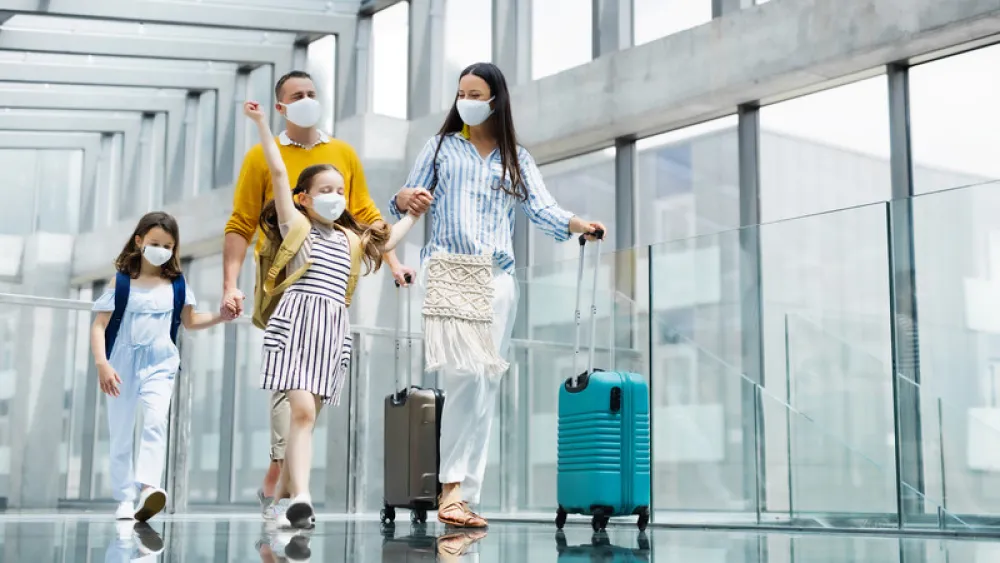
Today's Medicine
Traveling Again? What You Need To Know
Published: June 18, 2021

As more Americans become fully vaccinated against COVID-19, more Americans are also traveling – domestically and abroad.
But planning a trip isn’t as easy as it was before the pandemic. Different countries – and even different states – have varying COVID-19 risks and restrictions. So before booking that flight to Europe, do your research and get answers to common questions.
Frequently Asked Questions
Can I travel if I’m not vaccinated?
The Centers for Disease Control and Prevention (CDC) advises travel for only those who are fully vaccinated. Vaccinated or not, you’ll need to follow your destination’s state, local and territorial travel restrictions. Unvaccinated people who choose to travel may face additional testing and quarantine requirements.
Is it really safe to travel abroad?
If you’re fully vaccinated, there is little risk in traveling internationally. If you’re unvaccinated, there are dozens of countries that you should avoid – and a lot that won’t even let you in. Vaccinations around the globe are progressing slowly, and many countries are grappling with resurgence and dangerous variants.
Do I need to get a COVID-19 test if I’m vaccinated and traveling?
With the exception of Hawaii, vaccinated travelers do not need a negative COVID-19 test for domestic travel. For international travel, it depends on the requirements of the country you’re visiting. When traveling back to the U.S. by air, all travelers – even vaccinated ones – need a negative COVID-19 test within three days of boarding the flight. The CDC also recommends that vaccinated and unvaccinated international travelers get tested three to five days after their return.
If I’m fully vaccinated, do I still need to mask on planes?
Yes. Through Sept. 13, masking is federally mandated for people age 2 and older on planes, buses and trains and in airports and other transportation hubs. Airline passengers who refuse to comply with the mandate could face thousands of dollars in fines from the Federal Aviation Administration.
Dream trip, here I come!

Not so fast. Just because you’re vaccinated and at low risk for contracting and spreading COVID-19 doesn’t mean every country will welcome you with open arms. Some countries – even our friendly neighbors to the north – are barring nonessential travelers. For countries that do allow U.S. citizens, you may still need proof of a negative COVID-19 test even if you’ve been fully vaccinated. The CDC and The New York Times have great resources on countries’ risk levels and entry requirements.
Is it safe to go on a cruise yet?
The CDC still recommends avoiding cruise ship travel. If you do choose to go on a cruise, make sure you’re fully vaccinated. The risk of contracting and spreading COVID-19 on cruise ships is high because of confined spaces and the lack of social distancing. Some cruise lines are requiring that all passengers show proof of vaccination, but breakthrough COVID-19 infections are still possible. Travelers should also mask at ports since it’s possible to be around more unvaccinated people.
Should I travel with my vaccination card?
Especially if you’re traveling internationally, take your CDC vaccination card with you. Make a copy and have a photo on your phone for back up. If you lose your card, you can request a new one through your state health department’s immunization office.
What about vaccines for diseases other than COVID-19?
Now that international travel is opening up again, remember that many countries require proof of vaccination for a variety of diseases besides COVID-19. Depending on where you’re traveling and what your purpose is, you may need to get caught up on routine vaccinations or need something additional like the yellow fever vaccine. The CDC has a comprehensive guide to vaccine requirements by destination. Get vaccinated four to six weeks before traveling so your body has time to build immunity.
Before your international trip, visit with one of our travel medicine specialists. Our services include:
- All vaccinations recommended by the CDC
- Custom reports with health alerts and safety guidelines specific to your itinerary
- Disease information
- Safe travel advice
- Travel-related prescriptions, such as malaria prophylaxis or medication for traveler's diarrhea
- Post-travel treatment of illnesses and conditions, if necessary
How can I stay updated on a country’s COVID-19 restrictions?
As we continue this new phase of the COVID-19 pandemic, travel recommendations and requirements will be in flux. If you have an international trip coming up, sign up for State Department travel alerts. You can also regularly check the CDC’s website or visit a country’s U.S. Embassy website.
More Resources
- Learn more about Methodist’s Travel Medicine services.
- Read more articles related to COVID-19.
- Follow Methodist on Facebook, Twitter and Instagram for the latest COVID-19 updates.


